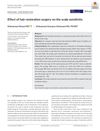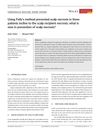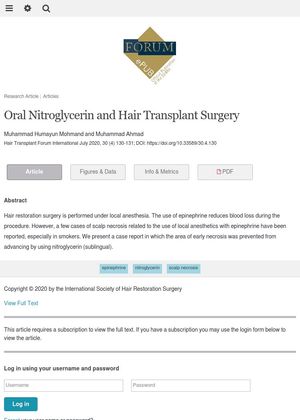TLDR Nitroglycerin can stop scalp necrosis during hair transplant surgery.
In 2020, researchers Muhammad Humayun Mohmand and Muhammad Ahmad reported a case where nitroglycerin was used to prevent the advancement of early scalp necrosis during hair restoration surgery. The surgery, performed under local anesthesia, typically uses epinephrine to reduce blood loss. However, there have been instances of scalp necrosis related to the use of local anesthetics with epinephrine, particularly in smokers. In this case, the researchers successfully used sublingual nitroglycerin to halt the progression of necrosis.
 1 citations
,
February 2020 in “Journal of Cosmetic Dermatology”
1 citations
,
February 2020 in “Journal of Cosmetic Dermatology” Hair transplant surgery reduces scalp sensitivity by almost 40%, and smokers have less scalp sensitivity than non-smokers. The time since surgery doesn't significantly affect this.
 5 citations
,
September 2016 in “Dermatologic Therapy”
5 citations
,
September 2016 in “Dermatologic Therapy” Feily's method, which delays grafting for 24 hours to improve blood flow, successfully prevented scalp necrosis in three hair transplant patients.
 28 citations
,
July 2011 in “Journal of Plastic Reconstructive and Aesthetic Surgery”
28 citations
,
July 2011 in “Journal of Plastic Reconstructive and Aesthetic Surgery” A patient had skin tissue death at the hair removal site after a hair transplant, which was treated with surgery.
 1 citations
,
August 2022 in “JAAD case reports”
1 citations
,
August 2022 in “JAAD case reports” Tofacitinib and oral minoxidil may help treat Sisaipho alopecia areata.
 April 2022 in “Journal of Cosmetic Dermatology”
April 2022 in “Journal of Cosmetic Dermatology” Trimax-360 Serum, when used for 98 days, safely and effectively improves hair growth, thickness, and density without any side effects.
 5 citations
,
January 2020 in “Journal of Dermatology”
5 citations
,
January 2020 in “Journal of Dermatology” Temporal hair loss relates to overall scalp hair loss in women.
 41 citations
,
December 2008 in “International Journal of Dermatology”
41 citations
,
December 2008 in “International Journal of Dermatology” South Korean women with hair loss have lower hair density and thickness compared to healthy women.
 October 1990 in “Archives of Dermatology”
October 1990 in “Archives of Dermatology” Hair loss and growth can be accurately measured using computer-assisted counting.








